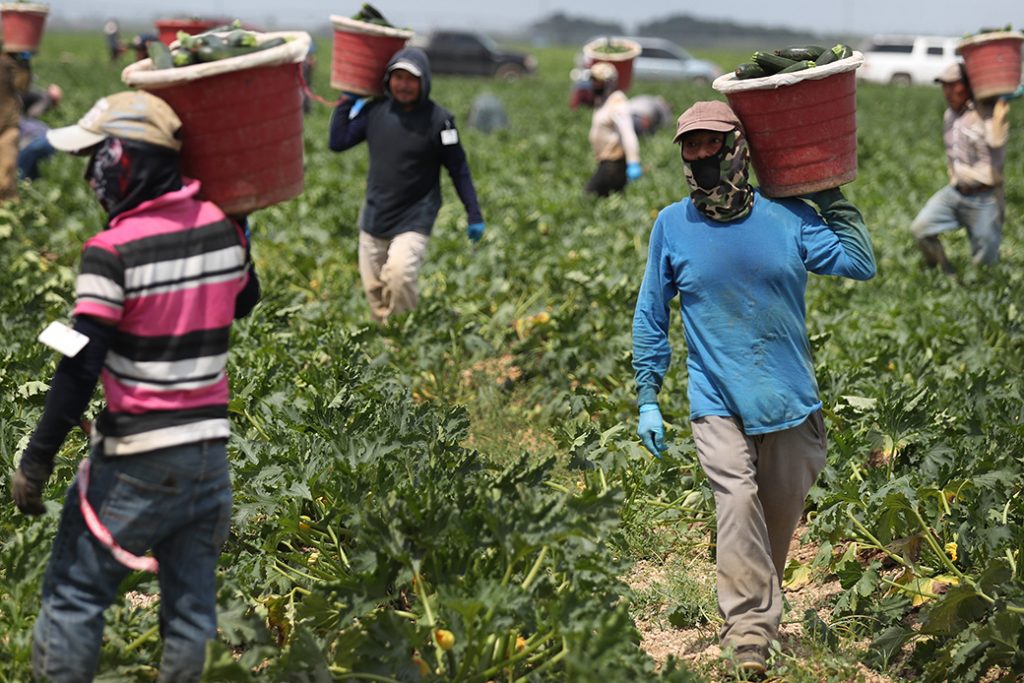
Featured Image: Farmworkers harvest zucchini on a farm in Florida on April 1, 2020 (Source: Getty/Joe Raedle)
By Jack Tripp
In this series, we have explored how political asylum seekers have been impeded in Europe and how China’s internal migrant workers struggle to provide for themselves and their families. But this issue should not be foreign to Americans. Immigration has been a hot-button topic for much of the past five years. However, COVID has threatened to subsume the serious conversation required. Migrant workers seek to access the resources of the U.S. economy, yet struggle to work around COVID’s externalities.
CBS and The New York Times have been reporting on Immokalee, FL, an area described by The New York Times as America’s “winter tomato capital,” since April. Doctors Without Borders—an organization known for saving migrants attempting to cross the Mediterranean and for treating victims of bombings in Syria—has established temporary medical centers in Immokalee to treat migrant workers. As many of the farm workers are undocumented immigrants, they lack the social safety net of insurance. However, they still need to work to support themselves and their children, especially as many already reside long-term within the United States.
The Times and CBS both interviewed mothers, Angelina and Gloria, each of whom has two children living with her in Florida. Gloria has a partner who can help support her children, but is diabetic. After a few days working without protection, she feared for the safety of herself and her children. When CBS interviewed her in June, she had barely worked since the outbreak of COVID. Angelina is a single mother who was healthy when the Times interviewed her at the end of June. As the harvest season ended, however, work was slowing down in Florida, and she was hesitant to take the cramped bus ride to New Jersey with her children to find more work.
Those migrant workers, like Angelina, who do not enter and exit the country annually travel to different regions throughout the United States. As described by the Times, after leaving Florida they will journey up the East Coast and then into the Midwest. However, state quarantine requirements—irregularly enacted and enforced—may cause difficulties, as harvest season is often only a few months while required quarantine is typically two weeks.
Although these workers are undocumented and not recognized by U.S. law, they are among the most essential. Without them farmers would be forced to leave perishable produce in the fields to rot. News sources such as Reuters, Politico, and The Wall Street Journal, among others, have all recorded instances in which fresh produce was wasted because it could not be picked and processed.
There is currently no federally organized effort to provide migrant workers with economic relief, although multiple non-profit organizations have established emergency funds. Justice for Migrant Women is one of these organizations. Their fund will be divided among multiple non-profits throughout the U.S. and Puerto Rico to buy masks for workers, pay for groceries, and help with rent payments.
With Florida becoming the epicenter of the pandemic in recent weeks, there are worries that the tight dormitory-style living conditions and collective travel on buses from one harvest site to the next will endanger workers. At the end of May, Bloomberg News reported that one farm in Tennessee tested its 200 migrant workers and they were all found positive.
Also of major concern are the increasing restrictions on guest worker programs, which are designed to address shortages in the labor market or to fill highly skilled positions. On June 22, the Trump administration extended various bans on immigration through the end of 2020. The Chicago Reporter reported that high-powered companies like Apple and Google expressed concern over losing the specialized employees who acquired visas through these programs.
The executive order itself was titled, “Proclamation Suspending Entry of Aliens Who Present a Risk to the U.S. Labor Market Following the Coronavirus Outbreak.” The administration argued that “American workers compete against foreign nationals for jobs in every sector of our economy, including against millions of aliens who enter the United States to perform temporary work.” The need for the ban was expressed not in public health terms but seemingly out of economic necessity. Yet many economists have expressed serious concerns about how immigration restrictions could impact the economy adversely. The National Center for Farmworker Health estimates that there are over 3 million migrant or seasonal farmworkers hired annually who fill agricultural jobs that many other workers consider undesirable. And as previously mentioned, American corporations need highly skilled workers—who could previously enter the country legally—to supplement the existing domestic pool.
After the Trump administration refused to grant visas to international students learning remotely, higher education united in a successful effort to strike down the ban. In a mere week, the administration rescinded the policy, demonstrating how much good a little forceful advocacy can do. Specialized workers will also have the support of high-powered companies behind them.
Yet a strong likelihood remains that essential migrant workers—in agriculture in particular—will not have the support that has proved so effective in protecting diversity, equity, and freedom of movement for legal immigrants. Unlike most international students and specialized workers, they often do not have a legal means of entry available. Although one of our most vulnerable populations, they are not offered centrally organized or government sanctioned support. Workers like Angelina, Gloria, and their families—who pick our food and support our economy at the most foundational level—need the same institutional backing that Yale and other communities have so readily offered to our own members.
Jack Tripp is a rising sophomore in Benjamin Franklin College. You can contact him at jack.tripp@yale.edu.